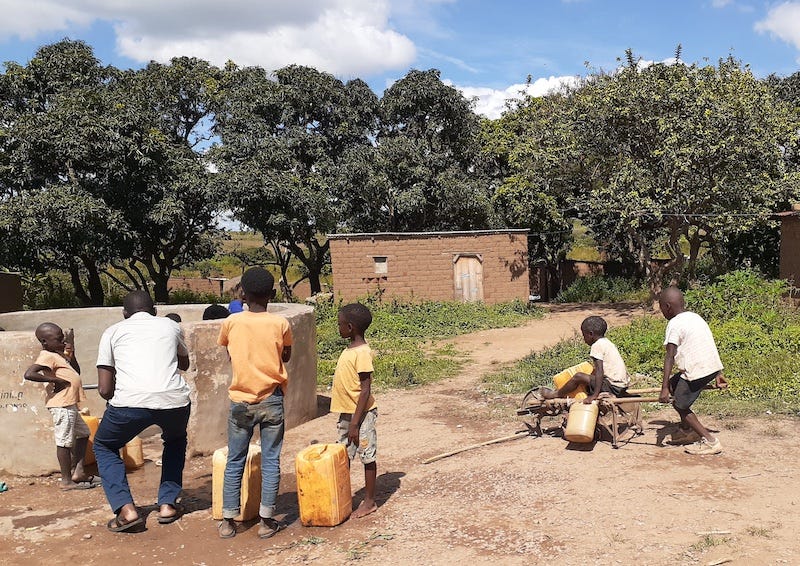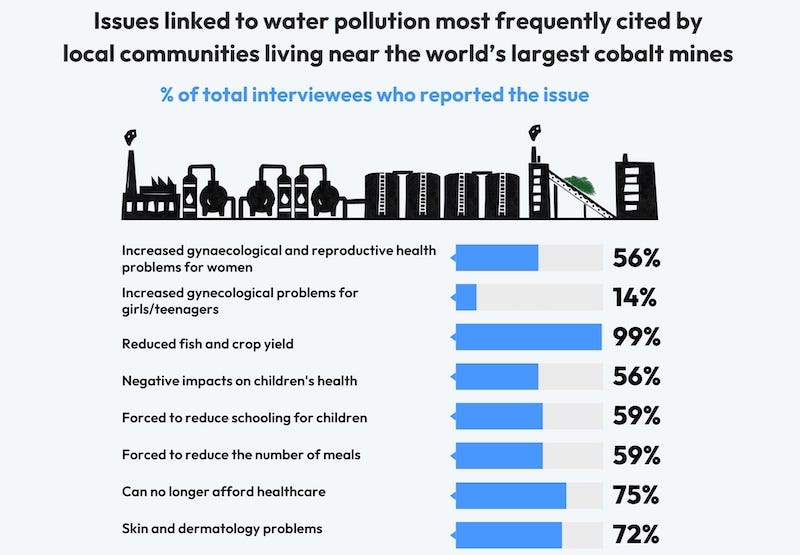Fear-mongering in the Cobalt-sphere? | News Round-up #52
In Peru, expansions and an order to pay medical care. In the US, tech companies aren't liable and a copper land swap upheld. In Brazil, regulators ask for help and rare earths gets US credit.
Climate technologies require enormous amounts of metal. I’m Ian Morse, and this is Green Rocks, a newsletter that doesn’t want dirty mining to ruin clean energy.
Updated with the article I mentioned with Mongabay.
Before the round-up, a note about a new journal article and report on pollution in the DRC:
Eight years after Amnesty International drew global attention to the risk of child labor cobalt from the Democratic Republic of the Congo, solutions have apparently missed the mark.
What emerged from the stir caused by AI’s investigation was a divide between artisanal mining (mostly done by informal workers and families) and industrial mining (done by some of the world’s largest companies). As this newsletter has written before, private sector supply chain solutions to formalize the former and boost transparency for the latter have fizzled out and in some cases hiked costs for small-scale miners. Meanwhile, large industrial mines owned by multinational firms with weighty publicity budgets have positioned themselves has clean alternatives.
Cobalt itself became a dirty word. Some media referred to it as the blood diamond of the energy transition, and a popular book on the topic took the title Cobalt Red: How the Blood of Congo Powers our Lives. In a recent ranking of the sustainability of EV supply chains that I reviewed for Mongabay, civil society groups chose to reward companies for avoiding cobalt altogether.
Earlier this month, two of the original authors of the AI report wrote in Business and Human Rights Journal that this approach is misguided. Emmanuel Umpula and Mark Dummett write that companies should engage more deeply with the DRC’s cobalt and its workers, rather than disengage completely. Luckily, the DRC government and civil society have put forward a number of solutions, such as strong enforcement of the Mining Code to protect artisanal miners. They write:
The reality is that for many people in the DRC, artisanal mining, not just for cobalt but other minerals too, provides one of the best opportunities to earn a living, in spite of the risks. Across the country, hundreds of thousands, if not millions, of people are engaged in this work and there is a ready market for the copper, cobalt, diamonds, gold and other minerals that they dig. …
What is needed therefore is urgent action, from the government and others, based on the priorities of the miners and their families, to protect human rights, and improve their working conditions, not condemnation or further neglect.
Unfortunately, authors of the ‘blood cobalt’ narrative do not provide any credible solutions.
Then, yesterday, Umpula’s AFREWATCH and UK-based watchdog RAID challenged the idea that industrial mining achieves some higher ethics than artisanal mining. In a 19-month study using 144 interviews across 25 villages and commissioned research, the groups found links between water pollution from mines and impacts to reproductive health, crop yields, and schooling. They write:
The results of the study show that DRC’s cobalt and copper mining region appears to be turning into a “sacrifice zone”, which UN experts describe as areas where people suffer severe health issues and human rights abuses from living in heavily contaminated areas.
RAID says it had extensive contact with five companies accused of contaminating water, including Glencore (which is expanding coal mines as it champions cobalt as a climate tool) and Zijin (which recently said it’s suffering due to anti-China geopolitics). All companies said water contamination came from past mining and artisanal mining. Executive Director Anneke Van Woudenberg told me:
…however, our research found there had been at least 14 significant toxic incidents over the past few years from the five mines including [tailing storage facility] breaches and sulphuric acid spills.
[EV companies] are increasingly aware they need to check their supply chains, and many are at least beginning to map these out in detail. Yet they still seem to depend on civil society groups to identify the risks they should be looking at. I find this a cop-out. They have infinitely greater resources than groups like ours and should themselves be investigating what their salient risks are.
News
Two Indigenous communities in the DRC claim that a Canadian and South African-owned tin mining firm has taken advantage of a conflict zone to avoid consulting and appropriate land used by the communities.
CSOs in Ecuador denounced a court for criminalizing people protesting a Canadian copper-gold project.
The Inter-American Court of Human Rights ordered Peru and the La Oroya Metallurgical Complex, which produces zinc, copper and lead, to pay for medical assistance to nearby communities and acknowledge a history of human rights violations.
Victims of the 2015 tailings dam collapse in Brazil are seeking $3.8 billion from Vale and its joint venture Samarco in a Dutch lawsuit.
A tin producer under investigation for illegal mining in Yanomami Indigenous territory in Brazil has supplied Disney and Amazon, among other major firms.
An Argentinian court has suspended mining permit approvals until current operations can conduct environmental impact assessments.
A US court found major tech companies were not liable for alleged use of cobalt sourced from child labor in the DRC.
Officials in Liberia fined two companies and shut down a third after investigating local complaints that people were often breathing in toxic dust.
A US court upheld a decision to allow a land swap that puts an Apache sacred site in the hands of Rio Tinto and BHP, which are seeking to build a copper mine. (Related Green Rocks edition)
Peru’s Las Bambas copper mine has announced an expansion, frustrating local communities who have been given little time to contribute input. (Related Green Rocks edition)
A Canadian gold firm lost a legal claim for damages after the Romanian government withdrew its support after country-wide protests in 2014.
Brazil’s mining regulator has urged the government to improve conditions at the agency, as officials say they suffer from a lack of personnel and budget that is out of step with law.
Protests against the presence of armed guards in Liberia’s mining areas resulted in one death, several injuries and 18 arrests.
India’s Supreme Court ruled to keep a copper plant closed after protests and environmental violations led to its closure.
Lithium Americas, which owns the Thacker Pass mine in Nevada, received a record $2.3 billion loan from the Department of Energy.
Seabed mining regulator the ISA is said to consider banning Greenpeace from the assembly.
Amid industry concern that there isn’t enough money to build out critical mineral capacity, commodity traders profited $100 billion last year.
Glencore is facing mounting shareholder pressure to keep its coal business in-house to ensure it can eventually shut it down.
Chile published its list of salt flats it plans to open to private investors, reserving two for state control.
An investigation found that Rio Tinto was Quebec’s third-largest environmental violator, handed more than 100 infractions in the last 15 years.
A collapsed bauxite mine in Russia killed one and injured another.
A mine owned by Indonesia’s flagship battery nickel operation continues to operate on a small island, despite the constitutional court affirming that it was illegal to do so.
A US government bank has offered $850 million in loans to two rare earths projects; one in Australia and one in Brazil.
The company behind the Pebble Mine in Alaska has sued the US federal government over the EPA’s choice to veto the project.
Research & Reports
Opposition to Zijin Mining’s copper mine in Serbia are intensifying. Locals have blockaded roads as mining operations seem to risk collapsing homes and contaminate drinking water. Just Finance International alleged that Chinese firm Zijin Mining forcibly confiscated local farmers’ lands and neglected to study the impact the mine has.
The Initiative for Responsible Mining Assurance released the first audits against its standard for African iron ore firms.
The UN Environment Program released it Global Resources Outlook, emphasizing that increasing rates of production and consumption demand urgent, concerted action.
Andrew Lees Trust published independent analyses of Rio Tinto’s water quality reports related to its QMM mine in Madagascar, finding that there’s no indication that contamination problems have come under control.
Reads
≠endorsement
Schoolchildren in Zimbabwe drop out for lithium mines (China Dialogue)
The Great Battery Boom (Podcast: The Big Switch)
Biden’s Big Bet on Aluminum (Heatmap)
Mining Companies Say They Have a Better Way to Get Underground Lithium, but Skepticism Remains (Inside Climate News)
Bases, experiments, mining: the race to protect the surface of the moon (The Guardian)
Ghana’s decades-old ambition to build an integrated aluminium industry faces a new hurdle: the clean energy transition (The Conversation)
America's lithium laws fail to keep pace with rapid development (Reuters)
Australia confronts an Indonesian nickel glut (Lowy Institute)
A battery price war is kicking off that could soon make electric cars cheaper. Here’s how (The Conversation)
DRC: Why it's hard to make cobalt mining more transparent (DW)
We rely heavily on lithium batteries – but there's a growing array of alternatives (BBC)
Why a shrinking US aluminum industry is tricky news for clean energy (Canary Media)
Deep-sea mining
Japan prepares to mine its deep seabed by decade’s end (Mongabay)
The Future of Deep Sea Mining Is Being Decided — Without the U.S. (Heatmap)
Seabed Mining Regulator Meets as Critical Minerals Drive Heats Up (Bloomberg)
Communities worry anew as PNG revives seabed mining plans (Mongabay)
India angles to expand deep-sea mining as race for minerals heats up (Semafor)





